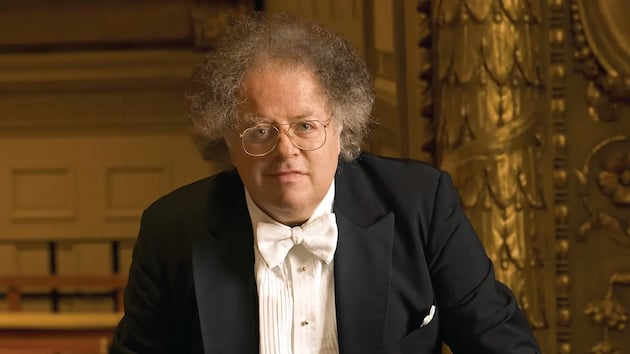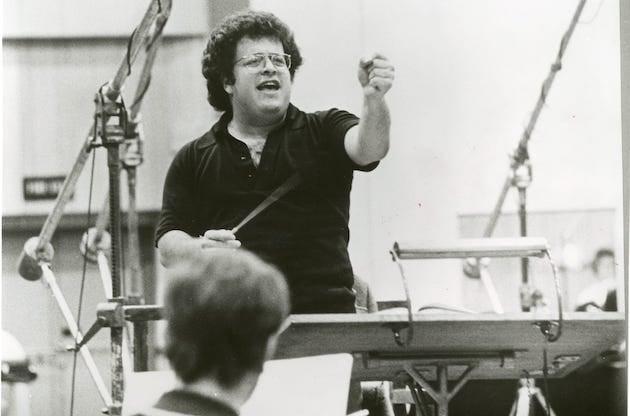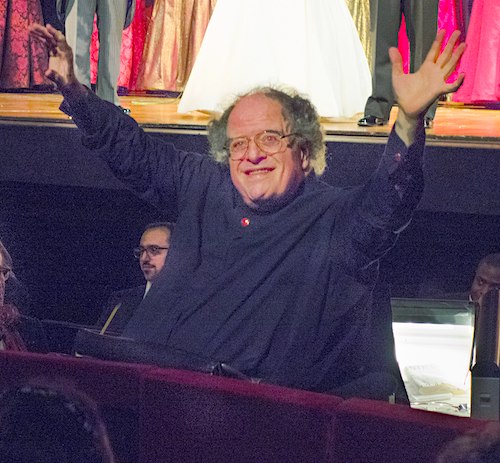
Most of us who love classical music can identify a charismatic figure who captivated us early in life, a master who seemed to embody the power and beauty of this art form. For me, such a person was James Levine.
The American conductor, whose March 9 death was revealed on Wednesday, was best known for his more than 2,500 performances at New York’s Metropolitan Opera, a remarkable run that came to an abrupt halt in 2017 when he was accused of sexual abuse. But for me, his most important post will always be as music director of the Ravinia Festival, where he conducted the Chicago Symphony for two decades beginning in 1973.
As a high school and college student, I spent countless summer evening on the festival’s lush green campus in suburban Chicago, enjoying my first live performances of much of the standard orchestral repertory. Admission to the grounds was very inexpensive in those days; while a seat in the pavilion was beyond my budget, I was happy to stand behind the last row, where I would watch the conductor’s gestures and body language and get a sense of how they impacted the sound the orchestra produced.
Previous to Levine, I had thought of conductors as distinguished old men. But he was a mere 12 years older than I was! Perhaps because of that closeness in age, his performances felt more inviting than those of, say, Georg Solti, the veteran maestro who conducted the symphony during the winter months. In that setting, with that conductor, there was nothing pretentious or intimidating about attending an evening of Beethoven or Brahms. Rather, the night air felt alive with something vital happening, right there, in that moment.

Forty years later, I learned that, during that period when he was enthralling me and so many others, Levine was taking sexual advantage of teenage boys he was mentoring. The news left me with a stunned and sinking feeling. I had long wondered how fans could enjoy the conducting of Herbert von Karajan while knowing he had been a member of the Nazi party. Suddenly I was in a similar position, feeling an uncomfortable mix of emotions that were rekindled by the news of his passing.
His career collapsed at the end of 2017, when The New York Times published detailed accusations of abusive behavior. More revelations followed, and a Metropolitan Opera investigation concluded that he had “engaged in sexually abusive and harassing conduct towards vulnerable artists in the early stages of their careers, over whom Mr. Levine had authority.” He was subsequently fired, but continued to deny the charges to the end.
Levine, who was born in 1943, was a child prodigy; he played a Mendelssohn concerto with his hometown orchestra, the Cincinnati Symphony, at age 10. He studied at the Juilliard School, where he switched from piano to conducting, and spent six years at the Cleveland Orchestra where he was mentored by legendary maestro George Szell.

He made his Metropolitan Opera debut in 1971, at age 29, leading a production of Puccini’s Tosca. Just five years later, he was named music director, and he held either that title or that of artistic director for four decades before assuming emeritus status. In spite of numerous health issues, he worked tirelessly, serving as artistic director of the Munich Philharmonic and, later, the Boston Symphony simultaneously with his work at the Met.
I don’t have many of his recordings in my collection — operas, mainly, along with a set of Mahler symphonies. Acclaimed in their day, the latter CDs haven’t aged particularly well. As Anthony Tommasini noted in his Times obit, Levine’s critics long complained that his work, however sensitive and precise, “lacked an identifiable character.” That’s a fair assessment of his Mahler, which seems bland compared to the recordings of his older contemporary Leonard Bernstein.
Or am I judging those recordings too harshly in light of the ugly revelations of recent years? It’s hard to know.
It’s equally hard to know what his legacy will be. It’s surely true that, as Metropolitan Opera General Manager Peter Gelb said Wednesday, that “no artist in the 137-year history of the Met had as profound an impact as James Levine.” But whether that ultimately matters will depend upon whether that company adjusts to the new realities of the 21st century, or goes down in history as a fading, bloated remnant of a past era.
News of Levine’s death comes just a few days after the final installment of the HBO documentary series about Woody Allen, another creative giant who has been credibly accused of sexual abuse (and one whose artistic peak coincides precisely with Levine’s). The series documents the abrupt shift in public attitudes regarding such men over the past five years, thanks to the #MeToo movement.
Perhaps because we were in awe of them, we used to give our creative geniuses tacit permission to break the rules the rest of us were supposed to live by. Anyone who could move us that profoundly was effectively granted license to act as they pleased in their personal lives, since we all agreed to look the other way. No more.
For Levine’s final performance at the Met, on Dec. 2, 2017, he conducted Verdi’s Requiem, which was one of his specialties. The text of its Dies irae section reads, in part: “When the judge comes to give strict justice ... whatever is hidden shall be revealed. Nothing shall go unpunished.” Revelations of his wrongdoing appeared on the front page of The New York Times the following morning.
So perhaps my sense as a young man that he embodied the music wasn’t wrong. It’s just that these timeless scores express the entire range of human experience — beauty and majesty, to be sure, but also the darker impulses that lead to tragedy. Levine not only brought them to life, he lived them.
Correction: James Levine was born in 1943, not 1934 as originally published.


